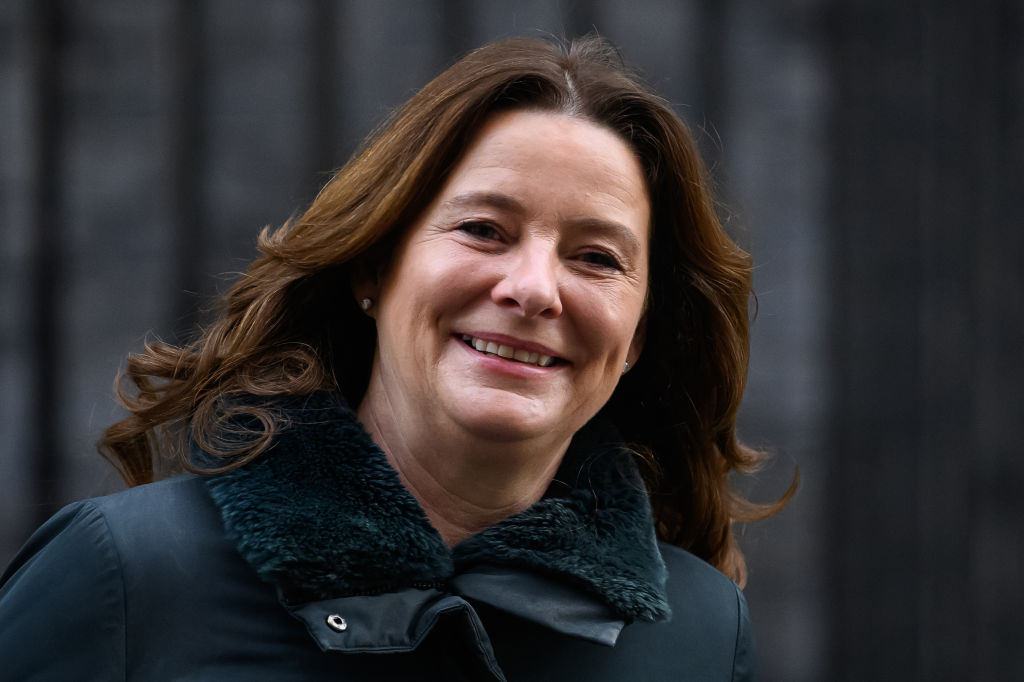Gillian Keegan has declared that she will no longer use the slogan, ‘trans women are women’ because, as she explains, her understanding of the issue has ‘evolved’. Good for her; it is far better that politicians develop their positions than dig their heels in and refuse to countenance the concept that they were ever wrong.
What happens when common sense diverges the from the hard facts of biology?
In 2020, the Education Secretary went further than the slogan when she told an LGBT+ forum in her Chichester constituency that ‘trans people should have equal access to safe spaces’. Assuming she meant that trans women should be able to access women’s spaces, that was wrong. Biological females should have an absolute right to single-sex provision whenever it is a ‘proportionate means of achieving a legitimate aim’. That’s the legalese, and it’s surely a legitimate aim for women to be able to protect their boundaries.
By 2020, it seemed that the scope of the term ‘trans woman’ had expanded to include any man who decided to claim it, and for purposes known only to himself. As a member of parliament, Keegan should have recognised that and understood the consequences. Other MPs did – Rosie Duffield and Miriam Cates, for example – but they faced opprobrium for speaking the truth.
Much has been said about the toxic nature of the transgender debate, but perhaps it was inevitable when matters of identity were at stake, and everyone worries that words as basic as ‘man’ and ‘woman’ are at risk of being redefined, and to their detriment. Two teams emerged – let’s call them team trans and team terf – and there was pressure to pick a side.
As late as 2020, it seemed that team trans was winning. Perhaps that is why so many politicians signed up to the team that spouted nonsense. A man cannot become a woman by wishful thinking, however glossy the brochures churned out by the likes of Stonewall. But now the tide appears to have turned – certainly in England – and team terf is in the ascendency. The cynical view might be that Keegan has changed her allegiance to be on the winning side.
She is not alone. On the other side of the Commons, Wes Streeting has performed a similar U-turn, now admitting that he had been wrong to say, ‘trans women are women, get over it!’ Perhaps the next fully-signed-up convert to team terf will be Penny Mordaunt, whose words from the despatch box, that ‘trans men are men [and] trans women are women’ have not been forgotten.
However, our politicians need to do far better than shift their positions when the wind changes. They need to understand the issues so that they can develop sound legislation that works for everyone, and without creating absurdities. Make no mistake, it was ludicrous to develop any policy from the flawed principle that trans women were women, and by self-declaration alone. We all know what a woman is, and it is not a man who does little more than demand ‘she/her’ pronouns and threaten the law on anyone who refuses to comply. I think that should now be clear to anyone who has engaged their brain.
What might not be so clear are the potential follies arising from the other position and the slogan, ‘woman is an adult human female’. That is true, but Keegan, Streeting, Mordaunt and the rest might want to reflect on what people actually mean when they use the words woman (and man) before rushing headlong into another position that may lead to absurdities of another kind.
We have been using those words – and others with the same meanings – since the dawn of time – long before we understood anything about chromosomes. Like other sexually dimorphic species we need to know the difference between the two kinds of the species and respond to them differently. Keegan’s thinking might have evolved, but so has our gut feeling of who is a man and who is a woman. Rishi Sunak came close to articulating that when he said, ‘a man is a man and a woman is a woman – that’s just common sense’.
But what happens when common sense diverges the from the hard facts of biology? Away from the furious debates on social media, in real life people take trans people as they find them. Medical science has moved faster than our evolved instincts and if a someone looks more like a woman than a man, then despite their sex, other people are going to have a hard time not calling them a woman and – inevitably – relating to them as a woman. Society could of course ban medical transition and impose rigid dress codes on each sex, but that is unlikely. Laws that insist that everyone is treated according to their biological sex for all purposes would open the door to a new set of problems.
We can and must do better than that, but to do so we need to move beyond a debate between two teams. We might be able to change the words, but the concepts currently labelled by ‘man’ and ‘woman’ are buried so deeply in psychology that they cannot be redefined. Any law that says otherwise will be an ass sooner or later.
Lasting solutions require more than backing the right team, they need to be rooted in an understanding of human nature. The sooner politicians realise the better it will be for everyone.








Comments